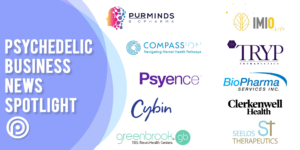
A recent study published in the International Journal of Mental Health and Addiction explored changes in substance use patterns in Canadians after taking psychedelics.
Sponsored by he Multidisciplinary Association of Psychedelic Studies Public Benefts Corp. (MAPS PBC) and Psygen Labs Inc., researchers from numerous universities conducted a cross-sectional online survey of 1639 participants 19 years and older who self-reported their current and past psychedelic use of 11 psychedelic or hallucinogenic substances including, ayahuasca, 5-MEO-DMT, LSD, ibogaine, 2C-B, mescaline, and psilocybin, MDMA, MDA, Nitrous oxide, and salvia divinorum.
According to the study findings, the participants reported significant changes in their substance use habits. These main findings include:
- Nearly 44% of participants reporting either having decreased or completely stopping alcohol use.
- 42.5% either reduced or stopped taking antidepressants.
- 42.4% either decreased or stopped taking cocaine.
The main reasons for the change in substance use were the participants feeling less anxious or depressed, more connected to nature, to self or to others.
The online, multiple-choice survey included Likert scales and open-ended questions, totaling 655 questions. Additionally, the researchers gathered data on “age, province of residence, self-identified racial background, gender, relationship status, employment status, education, and annual income.”
A Closer Look at the Results
The researchers found that the individuals who reported decreased substance use were more likely to be female, younger, have both microdosed and macrodosed psychedelics, and have used more psychedelics overall.
Interestingly, those who reported a reduction in substance use were younger individuals who also reported using more psychedelics overall. Additionally, there was a larger proportion of men who reported a decreased drug use compared to women, however, more non-binary identified participants saw a reduction in their substance use than men.
As mentioned above, the findings also indicated significant changes in reported substance use among participants. Approximately 44% of individuals reported having stopped alcohol use, 42.5% stopped or reduced taking antidepressants and 42.2% stopped or decreased their cocaine use.
The researchers also found that individuals whose motivation was to treat a medical condition by using psychedelics reported a higher reduction in substance use compared to those who didn’t have that intent.
The most effective reported psychedelics in decreasing or stopping drug use were psilocybin ( ~58%) and LSD (13%).
Approximately half of the participants said that there was “no set pattern in how long decreases in substance use typically persist after using psychedelics, or that it depends on the substance and circumstances”. Based on the findings, about one-fourth of participants reported that they decreased their use of other substances for a month, and 14.3% said their substances use reduction lasted over half a year.
The feelings of being connected with self, nature, and others were the main reasons why people reported having reduced their substance use, as well as feeling less anxiety and depression.
Moreover, the participants who had taken psychedelics to treat a mental health condition, who used more than one type of psychedelic were younger, and microdosed and macrodosed psychedelics were more likely to report that they had reduced their intake of other drugs after taking psychedelics.
It’s important to note that 222 people, or 13.5% of participants, reported either increasing their substance use or having started using a substance post-psychedelic use. Approximately 11% of participants reported having increased their cannabis intake and 9.3% increased their tobacco consumption, whereas the substances with the highest rate of initiation were amphetamines ( 3.5%). Of course, these numbers seem negligible, but still deserve to be reported.
Study Limitations and Strengths
There were, of course, some limitations in the study. For instance, because the researchers used a self-reported and cross-sectional survey method, they couldn’t consistently measure the change in patterns of substance use. Due to the nature of the study, there may also have been some recall and selection bias, which means that we cannot generalize the results to a larger population of psychedelic users in Canada or in North America.
However, the large sample size of Canadians who have used psychedelics is a good indication of how psychedelics affect the use of other substances which can help in future psychedelic research and can also contribute to informing future psychedelic policy makers on the possible benefits that psychedelics may offer.
Final Thoughts
The psychedelic renaissance movement has lead to persistent decriminalization and legalization initiatives in the Unites States. A multitude of clinical trials are progressing in hopes of proving that psychedelics can be efficacious in treating mental health conditions like depression and anxiety, while the FDA has granted a breakthrough designation to psilocybin and MDMA. Canada has also made moves by amending its Special Access Program to allow medical professionals to request access to psychedelics for those suffering from debilitating medical conditions where traditional treatments have been found to inefficacious. Considering that North America is witnessing a mental health crisis and an opioid epidemic, these study results should be added to the pile of documented research showing the psychedelics may potentially be more effective in treating a range of mental health conditions compared to traditional pharma treatments, which tend to come with significant adverse effects, and which tend to require continuous use. Though this psychedelic research push has lead to the potential FDA approval of psilocybin for depression and MDMA for PTSD in the United States and their legal use as prescribed treatments by psychiatrists in Australia, another challenge arises in the horizon, and that is affordable access to psychedelic medicines. Though we are still too early in the adoption curve, it is our duty to discuss and find solutions to these challenges so that we can co-create a better tomorrow.





